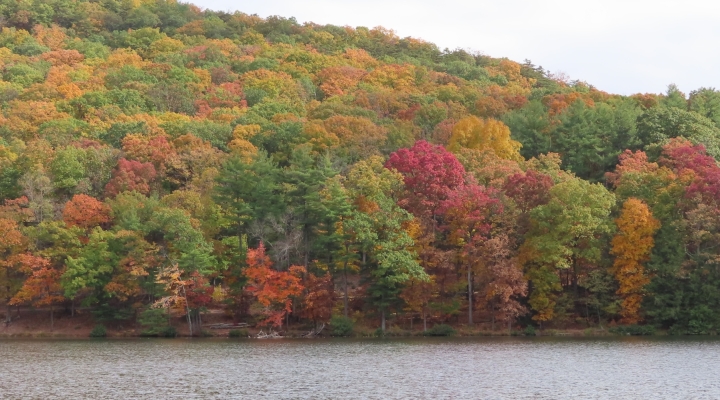CHAMBERSBURG, Pa. — October is here and fall is officially upon us. Thoughts turn to favorite things like football, bonfires, crisp days, and all things pumpkin. Add fall foliage to that list. Pennsylvania has a longer and more varied fall foliage season than any other state in the nation — or anywhere in the world. Pennsylvania, with its abundance of mountains and state parks provides a front row seat to experience the palette transformation from the rich greens of Summer to the vivid reds, oranges, and golds of Autumn. This is the season to enjoy nature’s process of preparing to protect its trees to survive the cold of the winter ahead.
Why do leaves change colors? An interesting fact is that some of the colors have been in the leaves all Summer. Photosynthesis is the process by which plants and trees use sunlight, water, and carbon dioxide to create oxygen and energy in the form of sugar. This provides nutrition to the tree. During this process, trees produce chlorophyll, a light absorbing pigment, which gives the tree its green color. The colors are masked by the dominant green color while the leaves are busy turning sunlight into food. Carotenoids (golden pigment) have been present in the leaf throughout the growing season. Most anthocyanins (red pigment) are produced in autumn. As Fall approaches, the tree prepares to shed its leaves because the tender leaf tissue will not survive the cold winter. The primary influence of change is that days shorten providing less light. Nights are longer and cooler, and the chlorophyll production slows down and eventually stops. Eventually all the chlorophyll is destroyed, and the carotenoids and anthocyanins are unmasked and show their colors. The timing of the color change varies by species, as well as the color pigment. Some trees become vividly colorful late Summer or early Fall, while others are still green. Oaks on the other hand show their colors after others have already shed their leaves.
The intensity and brilliance of the colors are related to weather conditions that occur before and during the time the chlorophyll in the leaves is diminishing. Temperature and moisture are the main influences. A warm wet spring, favorable summer weather and warm sunny fall days with cool nights can produce the most intense autumn colors. A severe summer drought can delay the color transformation by a few weeks. A warm period during fall can also lower the intensity of autumn colors. Abnormally dry conditions and high temperatures can also cause early leaves to drop in late September and early October. Although we have been experiencing drought conditions, Marc Abrams, a professor of forest ecology and physiology at Penn State University, has written “a lessening of extreme heat and drought and a continuation of cool nights can go a long way to save a season.” He also went on to note “I have been impressed in my years of gauging foliage at the resiliency of the display.”
So go out and enjoy this season of transformation. Whether the color is good or great, it is one of nature’s finest displays. The PA Department of Conservation and Natural Resources offers information on state parks, state forests, as well as Fall foliage reports on their webpage. Check out the Visit PA webpage for where and when to view our 2023 seasonal beauty. https://www.visitpa.com/article/when-and-where-view-best-fall-foliage-pa
—Sherrie McCleary, Penn State Extension








